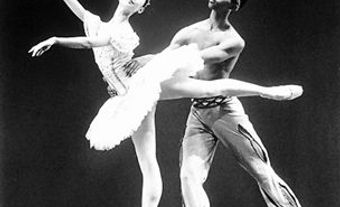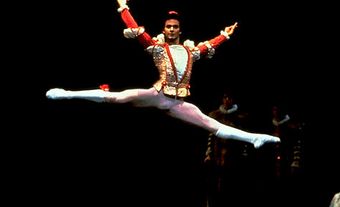Vancouver International Dance Festival
The Vancouver International Film Festival (VIDF) was founded by Barbara Bourget and Jay Hirabayashi in 2000. It takes place every March in venues in and around Vancouver, using the Roundhouse Community Centre as its central hub.The programming signature of the festival is one of cutting-edge contemporary dance by culturally diverse artists, highlighting work that is physically visceral, visually stimulating and thought provoking, in a balance of international, Canadian and local artists.
Hirabayashi and Bourget, life-partners as well as co-directors of their dance company KOKORO DANCE, organized an earlier incarnation of the festival in 1998 under the title of the "Vancouver Butoh Festival." Their goal was to develop an audience for butoh (a style of Japanese modern dance) and butoh-inspired work, their chosen creative form. Following the first festival, the co-directors expanded the scope of their programming while retaining a discernible emphasis on butoh.
The international focus was motivated by a desire to expose Vancouver to the international circuit of dance artists and programmers, making up for the lack of international companies touring through Vancouver at the time. Invited international companies have included Spanish dance artist Ana Arroyo, French choreographer Jérôme Bel with Thai dancer Pichet Klunchun, New York's Ronald K. Brown's Evidence Dance Company and New Zealand's Black Grace, and Japanese artists Taketeru Kudo, T42 (Switzerland/Japan), Yoshito Ohno (with Lucie Grégoire) and Natsu Nakajima.
While the programming of butoh work strongly flavours the festival, its aesthetic eclecticism is equally notable. Contemporary mainstays such as MASCALL Dance, Peggy BAKER, and TORONTO DANCE THEATRE have been presented alongside companies drawing from non-Western sources, such as Compagnie Danse Nyata Nyata and Flamenco Rosario, Ipsita Nova Dance Projects and Kaha:wi Dance Theatre, Raven Spirit Dance, and Gaetan Gingras. The 2012 festival highlighted the potent polarities contrasting ballet and butoh.
The mainstage ticketed festival program is partnered with audience-building activities including a rich offering of free dance performances, and visual arts exhibitions and dance workshops. Cross-marketing co-productions with the Vancouver Symphony Orchestra have also been presented.
It took several years for the festival to gain recognition from funding agencies and a stronger foothold among its Vancouver audiences. By 2009, attendance had tripled what it was in 2003. The 2010 festival, presented by the Vancouver 2010 Cultural Olympiad, benefited from the intense focus on artistic activities taking place around the 2010 Olympic Games.
VIDF continues to be a driving force in the Vancouver dance community by expanding the audience base for contemporary work, connecting to an international circuit and building bridges amongst the diverse dance communities within the city.

 Share on Facebook
Share on Facebook Share on X
Share on X Share by Email
Share by Email Share on Google Classroom
Share on Google Classroom


